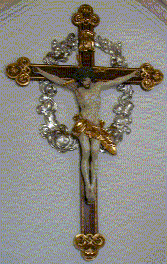Posted on June 11, 2005
Era Superiority?
Secularists sneer at B.C. & A.D.
by
Daniel Clark
Last month, the Louisiana state education department recalled about 53,000 high school diplomas, which had been deliberately misprinted. It seems that some easily offended secularist busybodies within the department had ordered the date marked with the politically correct initials C.E. Of course, the standard abbreviation, A.D., stands for "Anno Domini," or "Year of Our Lord." Not only do some education administrators find this offensive, but it's only a matter of time before the Ninth Circuit Court declares it unconstitutional.
For decades now, many academics have eschewed the identifiers B.C. and A.D. in favor of B.C.E. ("Before Common Era") and C.E. ("Common Era"). The superficial reason for this is that their favored terms, not being derived from religion, are more scientifically valid. This doesn't wash, though, because they are not using a different, more scientific system of measurement. All they're doing is continuing a futile effort to expunge references to Christianity from Western civilization. As one might expect, some elements of the media are joining in this effort.

Regardless of whether they refer to the time before Christ's birth as "Before Christ" or "Before Common Era," that event nevertheless serves as the reference point. They could rename that time period "The Wonder Years" for all the difference it makes; it will still be defined by its relation to the birth of Jesus Christ. (... And please, no e-mails telling me that Christ was actually born in 4 B.C. His birth is still the event that defines our calendar, even if our ancestors did miscalculate by a few years. Besides, Christ's existence "Before Christ" is not something to be taken lightly. Let's see Michael Newdow be born four years before himself. Then you can scoff.)
Not only do these new terms fail to divorce themselves from the Christian calendar, but they don't even make any semantic sense. How in the world can the period they call B.C.E. not be the common era? I mean, that's where everybody was at the time. You can't get much more common than something that includes every person on the face of the earth.
In that manner of speaking, it would at least be correct to refer to the modern day as the Common Era, although it would still not be concise, because there would be no logical reason for it to start at the time we would acknowledge as the year 1 A.D. If "Common Era" is meant to define the era that all of us living today have in common, then it should only be as old as the oldest living person. Unless Mel Brooks' 2000 Year-Old Man is still kicking around, this era should not have started two millennia ago. If, on the other hand, this era is supposed to be common among all people living and dead, then it must have started on the day the human race was created.
Moreover, the term is not applicable if you perceive the word "common" by its definition as something that occurs frequently or exists in great numbers. If there are only two eras designated to account for the entire existence of the world, then to call either of those eras "common," as in, "you eras are all alike," is nonsensical.

Still another definition of "common" is plain or unrefined. This imparts a higher social status to those people who lived in the years B.C.E. than to those of us in C.E. Thinking of it that way, one imagines cavemen standing around wearing ascots and monogrammed blazers, sipping cognac and saying to each other things like, "How do you think the little people will be living in the Common Era, Percy?" This conception of the term violates political correctness on two fronts: (a) it contradicts the theory of evolution; and (b) it's "classist."
The latter of these conflicts might not be readily apparent, since left-wing academics often employ demeaning terms like "the common man" or "the masses." However, they only do this when contrasting these victim groups with "the super-rich," or whatever other group is designated for punishment. If we are in the Common Era, it should follow that those who are not in the Common Era must be inflicting "economic injustice" on us. But what's a liberal to do about it? While it may be emotionally satisfying to raise taxes on people who died more than two thousand years ago, getting them to cough up their "fair share" would be nearly impossible. For one thing, you'd never get an accurate audit from Roman numerals, let alone rudimentary cave scrawlings.
That liberal elitists should lump themselves with the rest of us in this Common Era ought to be cause for suspicion, for they only rhetorically identify themselves with large groups of people in order to condemn those people, while exempting themselves. When a liberal wrings his hands over how terrible "we" Americans are, he is establishing himself as the exception, showing that he's not really an American like the rest of us. It's as if he's playing the role of the token un-evil white guy in a Mario van Peebles movie.
When secularist professors and news editors flatter the rest of us with their presence in our era, you know that they're only slumming. Sure, this little era of ours may be quaint, but they could never live here. After all, some people here engage in such lowbrow activities as driving American cars, going to weekly Mass, and perhaps worst of all, drinking instant coffee. The sensibilities of the enlightened can only withstand so much.

Does this mean that liberal elitists have the ability to travel through time? Not really, but that doesn't mean they haven't still created a new era of their own. They just didn't bother to tell the rest of us. When they devised their new terminology, they replaced B.C. and A.D. with not two eras, but three. Whereas "Before Common Era" is what they call the period before Christ, the "Common Era" encompasses both the period between Christ's birth until the birth of the new liberal paradigm, and the period that follows that one.
This new liberal paradigm begins with the replacement of Jesus Christ's role in Western society with that of liberal intellectuals, as symbolized by the acceptance of the abbreviations B.C.E. and C.E. In most places, this hasn't happened yet, and in some it probably never will. Within insular liberal institutions, however, this turnover took place long ago. That's how it can be that liberal elitists are living in a separate era, while still existing at the same time as the rest of us.
This is why liberal academics don't care about the inaccuracy of their terminology. It doesn't matter that there's no basis for their method of marking time, because it's only a facade. The era they're really trying to establish is not B.C.E or C.E. Rather, it's the B.C.E./C.E. era, or the Era of the New Liberal Paradigm. If they can succeed in mau-mauing the rest of society into treating all religious references -- including Anno Domini -- as hate speech, then they will have brought the rest of us into their new era, one that is defined by the preferences of the secularist Left.
What's basically happening here is that a group of mortals has decided to enter the deity business, and taken aim at their leading competitor in this market. Unfortunately for them, the quality of their product ranks alongside new formula Coke and the Arch Deluxe, with a marketing campaign to match. One would think that a bunch of fervent anti-Creationists would better be able to grasp the concept of "survival of the fittest."
The Shinbone: The Frontier of the Free Press
Mailbag . Issue Index . Politimals